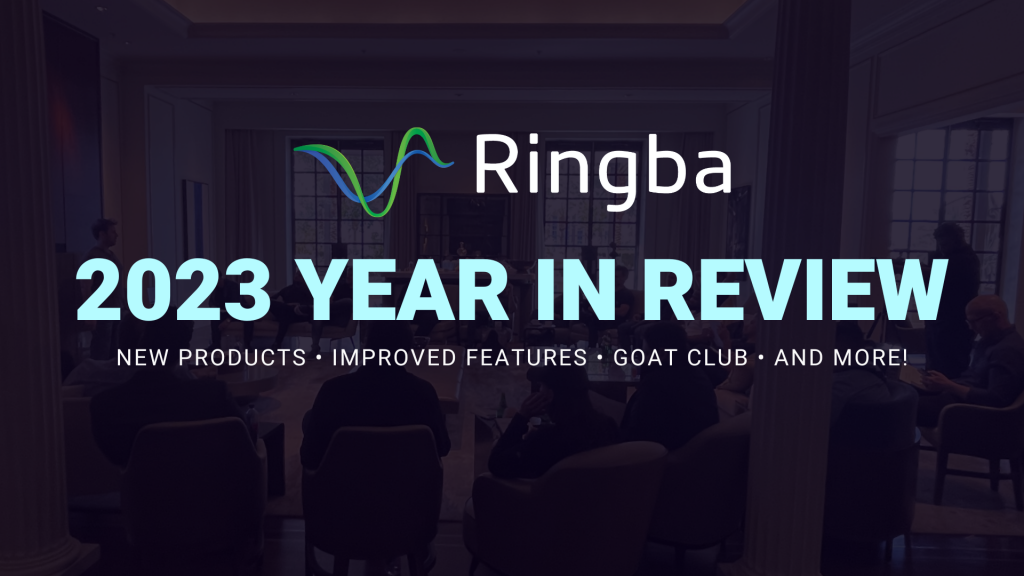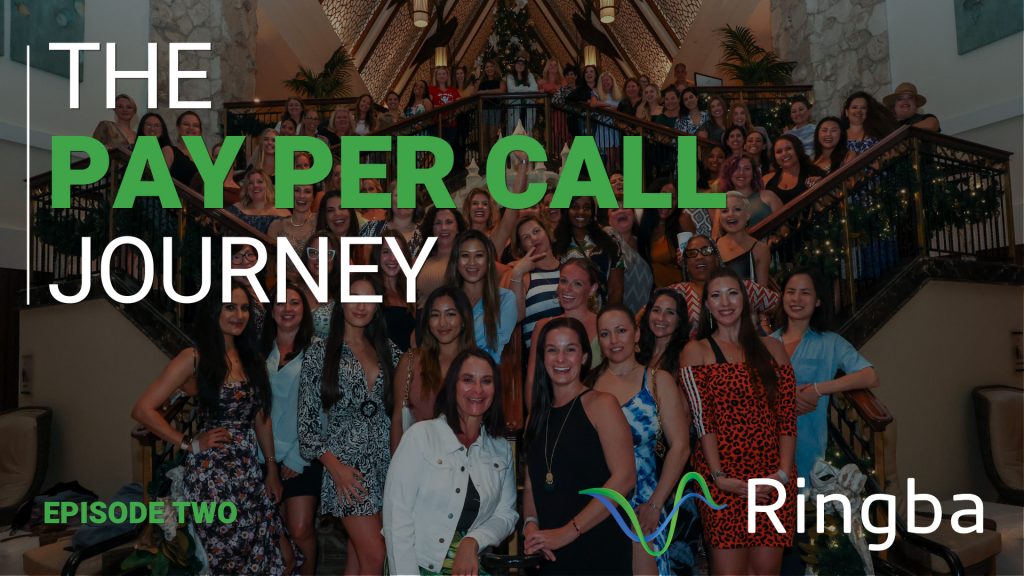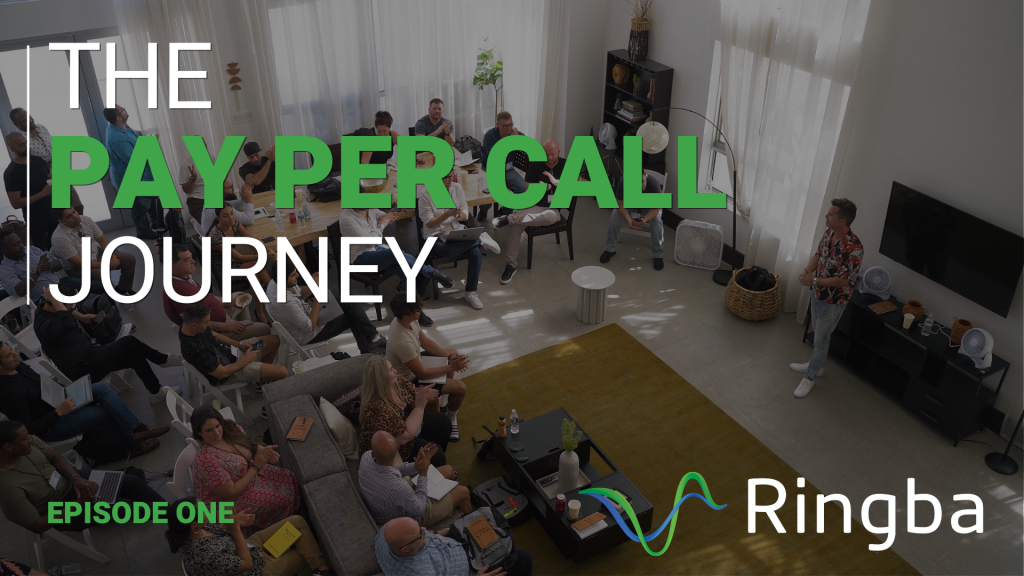Find out everything you need to know about managing publishers and working with affiliates to drive even more traffic to your pay per call campaigns.
Contents:
– Working with Affiliates and Managing Publishers
– Affiliate Screening Process
– Affiliate Onboarding Process
– Dispute Resolution
Working with Affiliates and Managing Publishers
Working with affiliates can be an extremely challenging process, but they are some of the smartest, most creative people on Earth and they can help take your business to the next level once you’re ready to expand.
The most important part about working with affiliates though is making sure that you have a process in place because you need to assume that you’re going to get defrauded at some point or that an affiliate is going to attempt to defraud you. If you don’t have that train of thought, you’re not looking through that lens, you’ll end up getting caught with your pants down, and it can be a costly process.
I’m not saying here that all affiliates are fraudulent. I’m not even saying that a large percentage of affiliates are fraudulent. I’m just saying that whenever you put out a program that’s in some CPA fashion so that people get compensated for getting consumers to complete an action, it has a high chance of propensity for fraud in general because it can be easy money if companies are not paying attention for fraudsters. It’s vital that you understand this and understand how to mitigate it from day one, or at least try to reduce it with processes and procedures from day one or you might run into a few different issues.
One of the ways that you can protect yourself is offering payment terms that are in line with the quality assurance process and in line with how you get paid. We’ve seen it before affiliate networks and Pay Per Call Networks fail. They go out of business. One of the number one reasons or the number one reason that affiliate networks go out of business is the fact that they have mismanagement of their accounts receivables. What I mean by that is they pay their affiliates really, really quickly and then their advertisers pay them later. What happens with that is affiliates get their money right away, sometimes before you can even catch fraudulent activities, and then the advertiser refuses to pay, so the network or the broker, intermediary, whatever you want to call it is left holding the bag. That is what you want to avoid when working with affiliate. You want to be careful when you offer accelerated payment terms to affiliates. By accelerated, I mean you’re paying them before you get paid for that traffic because then you become a bank, and that’s an entirely different business model. You need to understand your payment risk when working with affiliates.
You want to think about that and pay them appropriately. If you have a new affiliate that comes onboard, maybe over time you can offer them accelerated payment once you’ve proven their traffic. But you should never offer brand new affiliates weekly payments when they’re like weekly net one or weekly net two. It’s just not feasible to do that. It’s way too much risk on you, and if you don’t have a quality assurance process and team that’s in place and jamming, you’re going to run into issues and then you’re going to be left picking up the tab for affiliates fraud at some point. Maybe you get lucky. If you want to play that game, you can, but I think it’s better off that you don’t consider yourself lucky and you just put a structure in place, so it’s okay.
On the other side of that, you also want to have minimum payment thresholds for affiliates. You don’t want to be paying affiliates $25 checks or $25 payments. It’s too expensive to process the payments. There’s too much work that goes into actually issuing payments, so you want to decide what your minimum payment threshold is going to be. A lot of networks have $100 threshold; some of them have a $500 threshold or $250. You have to figure out what’s best for you and where most of your affiliates are based. If they’re in the United States, you can make automated ACH payments cheaply. It’s not a big deal. If you’re operating in the Eurozone, you have SEPA payments, which are super cheap and not a big deal. But if most of your affiliates are located around the world and you have to send wire transfers, there is going to be fees associated with that, and there’s a lot of work to structure a wire transfer. If you’re only paying out $250, the time related to that eats into your margin. You want to figure out what your minimum payment thresholds are.
I suggest that if you have a new affiliate come on board, that you pay them slower and then you make them aware of this. Like you’ll work up to weekly payments with your top affiliates, but you start them out with monthly payments, or they can’t get paid faster than that until they meet a specific threshold. In that way, it reduces your risk, and it also reduces your time when processing those payments.
You also want to have clear and repeated disclosure about when your affiliates are going to get paid. They need to know what the schedules are when it changes, what that schedule is. I can tell you right now if you’re ever going to pay an affiliate late, you better be the first person to notify them before they figure it out on their own or they’re going to run around and trash your reputation everywhere they possibly can. They should because if you aren’t going to pay someone on time, you should notify them in advance. That’s the correct way to handle that situation. It’s not to pay late and hope no one notices. The last thing you ever want to do is lie to someone about when your payment is going out. If it went out late, be honest with them. If you tell them that it didn’t go out late and then they received it late, they’re going to know and they’re not going to trust you anymore.
Do not play games with people’s money. They get very upset when you do. A lot of people take it personally, and you need to treat it with care. The best way to do that is, again, clear, and repeated disclosure. Email people when their payments are going out, email people before their payments go out, email people if there’s any change to their payments. I say email because then you have it in writing and you can reference it, should there be an issue. “Hey, we’re sorry that your payment went out a little late. There was a holiday. We notified you in advance through email. In the future, watch for those emails and if there’s an issue, ping us. We’ll try and do our best to accommodate whatever you need.”
You need a way to keep track of commissions. If you’re going to work with affiliates, you need a platform like Ringba. You want an independent platform like ours so that people trust it. They know that there’s no funny business going on with their statistics. We certify all the statistics, we make sure everything’s accurate, and then we take care of all the billing, commissions, revenue, payouts, everything inside of our system so that you don’t have to worry about it. You have to worry about paying your affiliates.
If you’re going to have a large volume of affiliates, like one or two, is not a big deal, you can do that manually. But if you’re going to have 50 or 100 affiliates that are getting payments on a weekly or bi-weekly basis, that’s a lot of payments to keep track of. You’re going to have to use some automated payment system. There are a few different types of automated payment systems that are widely used in performance marketing, Tipalti. A lot of affiliate networks and Pay Per Call Networks use it. They have an excellent platform. You can very easily see large numbers of affiliates all around the world with that.
If you have a lot of people in Europe, Payoneer is a great option. They have an excellent system for distributing payments to wallets all around Europe and all around the world frankly. If you want, you can even use PayPal. Their mass payment system allows you to upload a text file or CSV of payees. They charge you a flat rate of $1 per transaction and then handle all the bulk payouts for you. You need to look into automated payment systems if you’re going to have more than a handful of affiliates. Otherwise, you’re going to be spending a lot of your time doing payouts and accounting. That adds up because it prevents you from doing business development. The cost of an automated payment system is a profit center if you think about opportunity cost.
You are going to want to charge your affiliates to send them payments. If they’re getting a wire transfer, you should bill them and deduct the fee for that wire transfer on their payment. Almost all affiliate networks and Pay Per Call Networks do this, and so you really should charge if they prefer a wire transfer. Now, if they want an ACH or SIPO or they’ll take Paypal mass payment, you don’t need to charge them because it doesn’t cost you anything. But if they want the wire, you should bill them.
And overseas payments are going to be a little bit trickier too, and that’s why I highly recommend using one of these payment service providers. Because if you’re dealing with overseas banks all around the world, you never know where your affiliates are going to be located, and there are all sorts of banking rules and regulations and anti-money laundering compliance and all this stuff. If you start sending a large volume of overseas payments to random countries, your bank is going to ask for more information. You’re going to have to configure all these wire templates. It ends up taking a lot of time, and that’s what you want to avoid. That’s why I am very pro automated payment systems whenever you get beyond just a couple of affiliates. If I were going to open a Pay Per Call Network, one of the first things I would do is open an account with an automated pay system. The last thing I want to do is manually process payments, or pay someone to sit there and manually process payments when there are automated systems that can take care of all that for me. Because of the end of the day, the cost is mostly irrelevant when you compare it to the opportunity costs to being out there trying to land more clients or whatever you can do to grow your business.
Affiliate Screening Process
Whenever you’re working with a new affiliate, you want to implement some screening process to weed out the problems. If your brand becomes recognizable in the space, there are some affiliate fraud groups for Pay Per Call and some networks maintain a shared spreadsheet of fraudsters and problematic partners with complete records of what happened, who they are and all that information in it. Once you get to a point where the industry recognizes you as a legitimate player, all you have to do is ask a few people or ask someone on the Ringba team, and if we feel it’s appropriate, we can grant you access to some of those things that can help you prevent affiliate fraud. They’re very, very helpful. The community comes together, and they like to avoid this type of thing. It’s a neat function of the community.
Let’s get back to the questions. When you have a new affiliate come on board, you want to ask them a lot of questions. If you have a form on your website and it has a lot of fields on it, it’s going to reduce the number of people who are willing to take the time to fill that out. In the case of affiliates, that may not necessarily be a bad thing. Because the lazier they are, the more likely they are to commit fraud, and they don’t want to fill these forms out. Some great affiliate, even myself in the past would hate filling these forms out because affiliates generally have an ego and they don’t want to waste their time doing something so trivial as filling out a form. But if they weren’t a referral, this is an excellent way to screen them. You’re going to see how they communicate, you’re going to see if they’re willing to invest the time into filling out your form, and you’re going to get a bunch of information about them and what is vital to their business, and then you can decide.
Questions to ask:
– How long have you been in the industry?
– Do you work with any other networks?
– Do you have any references?
– What campaigns are you currently running?
– How do you generate your calls?
– What types of traffic are you working with?
– What are your goals?
– How do you make sure the calls are quality?
– Have you ever been terminated from a network?
– How much concurrency can you generate?
– How many calls per day?
I think when people put in a lot of effort, they fill out your forms, and they try to communicate with you, it’s worth taking the risk of giving people a shot. A lot of Pay Per Call Networks in the space will not do that. That’s why if you’re an affiliate, you need to take the time to fill this out. If you’re going to work with affiliates in the space, it’s essential to have this process in place so that you can judge people by how they communicate and what they say to you.
An important question is, “How long have you been in the industry?” And what I mean by that is performance marketing. Just because someone’s never run a Pay Per Call campaign, does not mean that they’re not a great affiliate. We have a new client on our platform that I met at a trade show, and they showed me their stats. They were doing $400,000 a month in affiliate commissions and never ran a single phone call. They didn’t know how to do it. So I said, “Hey, I’ll teach you.” And they’ll be our customer, we’ll make some introductions for them, and they’ll move along their way and be very successful at it. Just because someone has never run a call campaign before, doesn’t mean they’re not a great affiliate. You want to ask, “How long have you been in the performance marketing industry?”
Next question, “Do you work with any other networks?” I think this is a straightforward question because if they yes and they name them, then you can ask that network about the affiliate and if they’re traffic’s legitimate. This is why you want to have great relationships with as many people in the industry as possible. You can ask them for references. Not a lot of people do this, but I like to ask for references because if people have references, I’ll contact them. That is important. If someone gives you references and you’re considering working with them, contact the references. Ask them what campaigns they’re currently running, how they generate their calls, the types of traffic they’re working with.
And if you get an application and they say a few different traffic sources, or how they generate their calls and you’re unsure, or their answers don’t paint a perfect picture for you, you should follow up with them and ask them for links to their landing pages. If they’re willing to show you their landing pages and be transparent about how they’re generating their calls, it’s probably a good sign that they’re going to be an okay affiliate.
I also like to ask people what their goals are regardless of whether they’re going to be a Ringba customer by running a network or whatever the case is. Tells you a lot about the person if they tell you what their goals are. Ask them what their goals are if they said they want to learn about Pay Per Call, or they want to build a business or whatever their answer is, it’s going to give you some insights into who they are. Because realistically, were also judging the person if we’re going to work with affiliates because we’re not going to get to meet him in person if they’re applying online. We may not even talk to them over the phone first. We create these relationships on the internet out of thin air. It’s essential to get to know who these people are so that you can better judge whether they’re going to be a legitimate player or not.
Then you should ask them, “How do you make sure that your calls are quality?” It’s going to tell you whether they even know that their calls are quality or not. Then you can ask them if they’ve ever been terminated from a network. I don’t think most affiliates, even if they have, are going to answer yes. But if someone’s been terminated from a network before and they do respond yes to this question and then tell you why I think that shows a commitment to honesty. It doesn’t mean you shouldn’t necessarily work with that person. Maybe you pay a little bit closer attention. But if they tell you the truth to something terrible, to me that’s a good sign because people make mistakes, we all do, I have, you have. If they’re honest, maybe they’re worth a shot.
Then, “How much concurrency can you generate?” I think this is an important question because if they don’t understand what concurrency is, maybe not a great partner or they’re very new. Then how many calls per day, right? You want to know how many calls per day they’re running so that you can get the size and scope of the opportunity.
You can ask them a whole slew of other questions. You can ask them how many different campaigns are they running, and what verticals are they in, and what campaigns have they run in the past, and what are the most significant challenges that they’re facing, and a bunch of other stuff. You can ask them an endless list of questions, but my point here is that you should ask a lot of questions of affiliates when they get started because you want to weed out the fraud and you want to know who you’re dealing with primarily. Because if you don’t know who you’re dealing with and you let anyone run any of your campaigns, you’re going to get fraud, you’re not going to understand why, and it’s going to get messy, you lose buyers, and it’s a bad thing. You want to stay on top of it. You want to see that the affiliates are going to put in the time to communicate with you, that they communicate clearly and promptly and answer lots of your questions with a thorough, well-thought-out request.
If someone answers with just, “Yes, yes, yes, yes, yes” to all the questions, well you know that’s a waste of time. It’s like our Facebook groups. We ask three simple questions, and some people answer, “Yes, yes, yes.” And you know what we say, “Decline.” So that filter gets rid of a lot of the problems before they ever start, even though it’s a straightforward filter. The more complex your questionnaire is the more filtering and better off you may be.
Affiliate Onboarding Process
Once you have a bunch of affiliates that are applying to your platform, you need to come up with some onboarding process when you’re working with them. The reason you want to come up with a formal process and write it out is so that you can replace yourself so that you could bring on an affiliate manager at some point, and then this process is a process. Then when there’s an issue, you judge the process, not the people executing the process. I think this is important if we’re going to talk about working with the team or building a team, is that a lot of small companies don’t put into place a process. When you don’t put into place a process, you end up blaming people. But if people don’t have a direction or a process to follow, they have to figure it out on their own, and then mistakes are going to happen. That’s a messy way to run a business because emotions get involved, people take things personally, and it goes badly typically.
NASA, on the other hand, is very process-oriented. The software developers at NASA have a detailed process for how they do things. That’s because when they make mistakes, people can die. Also, if you make software mistakes, it can be a problem if your satellite is halfway through the solar system and you can’t communicate with it anymore because there are bugs, you got major problems. What they do is they write these very intricate processes, and whenever they have a dispute, they dispute the process, not the people following it. That keep the emotions from coming out and causing problems with your team. That’s why I’m a big proponent of processes, and you should create one for your affiliates when you get started. It’s merely a checklist.
Like new affiliate comes on board, we’re going to review their application. We always send an email to the affiliates and ask them a few follow-up questions no matter what. Then, once we get them onboarded into the network, we have a conversation with them about what type of offers they’re looking for. We ask them a bunch of follow-up questions; then we approve them for those offers, then we give them tracking numbers, then we follow up with them three days later to find out if they’ve implemented or not. We watch their traffic, we implement tapping on their traffic, and then after a specific period, we do quality assurance on that traffic. Maybe six days after they start or five days after they start. If the quality assurance comes back okay, then we raise their cap a specific amount. Then after three months of quality traffic, we’ll accelerate payment terms. Whatever this is, you need to come up with it on your own and then create an actual process to follow so that your team can follow it. Then once you hire more people, they know what to do, you don’t have to train them. They have this like a checklist to follow.
And small companies don’t typically do checklist, but they’re super, super powerful and straightforward because if there’s an issue, you go back to the checklist and you ask your affiliate manager like, “Hey, did you follow the checklist?” And they say, “No.” All right well, time to retrain. What we’re going to want to do as well during this onboarding process with affiliates is do a lot of quality assurance. That could take a lot of time, and a lot of networks don’t do a great job with this, but if you’re going to work with affiliates, you should invest in the quality assurance. How do you do that? You listen to the recording.
So new affiliate comes on, you want to listen to the calls daily. Then you want to compare the average handle time to other campaigns and affiliates on your platform to see if the average handle timelines up. Because if it doesn’t line up, something could be wrong there. You’re going to want to check for prank calls and mystery shoppers. You want to see what the caller sound like if they’re interested or they’re incentivized. You’re going to want to do a full quality assurance grid on new affiliates calls to make sure they’re right. That doesn’t mean you personally have to do it, though in the beginning you absolutely should so you can understand the process and create your QA grid. Once you figure that process out, you should hire a virtual assistant or someone overseas, use Upwork and get them to listen to the calls, and then submit quality assurance grids to you and your team so that you guys can assess these things without investing hours and hours doing it yourself.
If you’re going to use the Ringba, we allow you to speed up the playback recording. Not only you, but your outsource people will spend less time doing quality assurance. That puts more money in your pocket.
You also want to review long call to see if those calls are converting for buyers or to see if there are any anomalies with those. If they send you 10 or 15 phone calls, you can QA them all and figure out if they’re backend conversion rate for your buyers is decent. If it’s okay, you know you probably have a high-quality affiliate. If it’s terrible, you want to deal with that situation immediately. You don’t want to wait. You don’t want to come back to the affiliate two weeks later and then tell him they’re not getting paid. That’s like worst case scenario for an affiliate and your brand. It should never happen. Then somewhere in your process, you should schedule a one-hour review/plan to move forward with the affiliate.
Lastly, but most importantly, you need to discuss any issues with affiliates transparently, and you need to be on top of this so that they’d understand what the rules are, and they know what they need to do. I highly recommend that you watch my lesson on quality assurance because we talked about this in detail. But essentially your insertion order and your contract with affiliates should have like a cover page or an addendum with it that lists everything that’s not allowed, and then you have them sign it. Then during that one hour review, you review it with them, or you do it during the onboarding process over the phone so that there is no question what is and is not allowed on your platform or with your campaigns. If you don’t take the time to do that and an affiliate does something you don’t like, and they’re not aware of it, they’re going to think you cheated them when you don’t pay. That’s why it’s important the super transparent about this. I think everyone in the Pay Per Call space to do a better job always about this. It should be a constant and never-ending improvement cycle, and communication should be at the forefront of that.
Dispute Resolution
You should count on it, you should have a process in place, and you should know how you’re going to handle these types of things in advance.
The first thing you should do when you have an issue is to determine your exposure. What I mean by that is you need to figure out the financial liability of that issue. Is what the affiliate did going to make it, so you’re not going to get paid from your partner? Did your partner notice? Are they going to pay you? Is this a significant issue? Do you need to communicate it to your buyers? What do you need to do?
First and foremost, you determine your exposure. Are you going to take a loss? And a loss can mean financial, reputation, or partner loss, buyer loss, whatever.
Next, you’re going to need to assess if they broke the campaign rules because if they didn’t break your campaign rules because your rules didn’t cover the issues, you also are at fault. What I see and what I’ve seen in the past is people will be sloppy about their campaign rules and requirements, and then an affiliate does something that the buyers don’t like, the network says, “Oh, the buyer’s unhappy. I’m not paying you.” And then the affiliate is like, “Wait a second. I followed all your campaign rules, I communicated with you, your rules are right there, and I didn’t break them, you’re burning me.” And the network is like, “No, you sent me crap calls, the buyers not happy.” The affiliates are going to be like, “That’s not my problem. I didn’t break the rules. You took three weeks to tell me that there was an issue. You need to pay me.” And that scenario, which happens quite often in the affiliate space, I would side with the affiliate. Even if I owed them money personally, I’d side with the affiliate. Because if I was not on my campaign rules and I was not on my quality assurance process so that it happens quickly, that’s not necessarily the fault of the affiliate.
If you have a quality assurance process that’s good, you’re communicating with your buyers, and buyers say the quality is excellent and then three weeks later, changes their mind, well that’s the buyer’s fault. I’d demand the money for that. But if you’re in communication with all parties at all times and you’re doing an excellent job on your QA on both sides, you won’t run into these issues. When you do have a problem, it’s simple, and you can handle it. If you catch bad things quickly because you have a good QA process, you can go back to the affiliates and be like, “Hey, the quality is not good on this. How do we work together to resolve it?” And then eating the $100 in phone calls that were an issue isn’t a big deal, you help him resolve it, you make it up in the long run, you got a happy affiliate, you got to happy buyer instead if you’re not on top of it, you just piss everyone off.
You want to try and work with the affiliate whenever possible unless it’s like straight fraud. If it’s something new or they didn’t follow the rules, or there was no real malicious intent, you want to work with the affiliate. Because if they came up with a new way to drive calls to a campaign that the buyer had never seen before and your rules didn’t cover, that’s probably a pretty smart affiliate and you should figure out a way to work with them and establish a relationship. You’re going to have to do a little more oversight perhaps or get them to communicate more, but those are the people you should be looking for. If they didn’t attempt to do anything fraudulent or break the rules, they’re just bright and should leverage that.
The next thing you should ask yourself when you have an issue is, how do you improve compliance procedures? How do you improve quality assurance procedures? Because any time you have a significant problem, you should personally be taking some responsibility for it and changing your processes. Because if you had an issue and it was bad, and it took weeks to resolve, that’s a procedural problem, and you need to change it. This is one of the ways that you will have compounding issues with your business. If you do not improve your compliance procedures over time to adapt to what you learn, you’ll run into more issues or worst-case, you’ll have the same problems repeat themselves.
If you have an affiliate get in trouble for something and you didn’t catch it, and then two months later the same thing happens with a different affiliate, it’s your fault at that point, and you need to improve your procedure. I see it time and time again. It’s imperative that everything in your business is flexible and you’re willing to improve upon it regardless of what happens.
My next question you should be asking after any event that’s negative with an affiliate is, “How do you prevent future incidents of this nature?” You should even have an incident report for every incident with an affiliate that your affiliate managers or you also fill out. The question at the bottom of that should always be, “How do you prevent future incidents of this nature from occurring?” And then you get your feedback from your team, and you make sure it doesn’t happen again. Because if you have a lot of incidents that result in pissed off buyers or bad payments or quality assurance issues or terminated affiliates, you’re going to build a negative reputation, and it’s not going to help your business out. Your reputation is everything in affiliate marketing, Pay Per Call marketing, and you need to maintain it.
I will assert that non-payment to an affiliate should always be your absolute last resort, even if it’s easy just not to pay them. I’m going to repeat that. In my professional experience and opinion, non-payment should always be your absolute last resort. If some calls were good and some were bad, pay for the good ones, don’t pay for the bad ones and offer evidence of the issue to the affiliate, so that they know precisely why you’re not paying them and be transparent about it. Because if you do not pay people and you don’t communicate, you’re going to suffer reputation damage and you’re going to get public posting. If that’s the only reason why you don’t screw people over because you don’t want reputation damage or public posting, I’ll take it. But realistically, non-payment should always be your absolute last resort because I’m assuming that we’re all not pieces of crap here and we want to conduct actual business professionally.
Affiliates are extremely fickle about payments, and that’s why you have to be on top of your game. If you’re not on top of your game, and you don’t communicate well, and you don’t have a good QA process, you will take reputation damage. People will hear about it even if the postings aren’t public, and that can cost you millions of dollars.







